Consecrated Life

“Come, follow Me” (Lk 18:22)
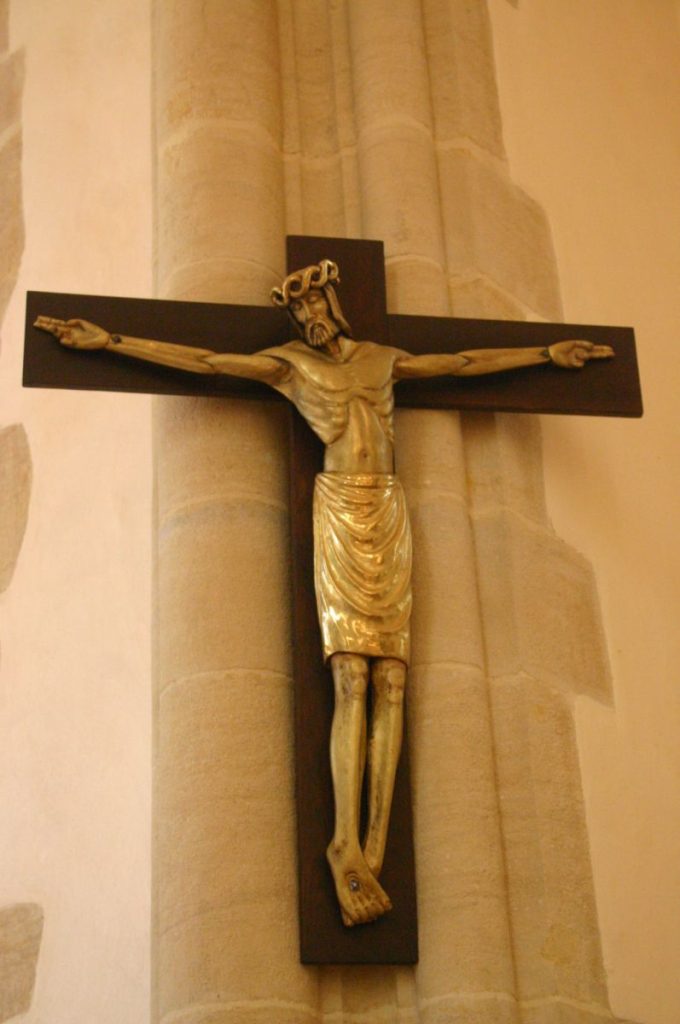
Through the Sacrament of Baptism every Christian has a personal vocation- a call from God – to holiness and service. A call to Holiness means: a call to enter into an intimate relationship of love with God. Marriage is like “an icon” that expresses in the best human way what this intimate relationship is like. Saint Paul speaks about this in the letter to the Ephesians: “For this cause a man shall leave his father and mother, and cleave to his wife; and the two shall become one flesh.” This is a great mystery – I mean in reference to Christ and to the Church. (Eph 5:31-32). The “Church” that is: “every Christian”, who is a member of the Body of Christ, that is the Church. God’s call is an invitation, an invitation that expects an answer from each baptized person.
This call is lived out in different ways: by being married, ordained as a priest or deacon, or consecrated as a religious brother or sister. The Holy Spirit urges all of us to answer this call, to enter into this relationship of love with God. This answer is also made manifest by our love for our human brothers and sisters. The Holy Spirit invites all of us therefore to share our gifts, talents, and lives in service to others. God calls us from a silent voice deep within to “Come and follow me”. All states of life are to lead to this relationship of love with God, the pursuit of his will, and the ultimate achievement of holiness and its eternal reward. The call to holiness, to love, is the same; only the way is different.
What is God’s will for your life?

The process you will follow to answer this fundamental question is called discernment. This is a process that takes time. Your vocation as a Christian will be the particular way you live the universal call to holiness. Through prayer, conversation with others, study and reflection, you will be able to discover God’s plan for you. What will be your path to Heaven? Click here to read more about discernment.
Your vocation is more than your career choice or occupation. It is God’s invitation to answer His love for you, to live out your commitment to holiness and service in a specific lifestyle that you choose. Throughout the centuries, men and women have responded to God’s call to commit themselves wholly to God and to God’s people through the consecrated life.
CONSECRATED LIFE

Some of the faithful are offered a special gift, an opportunity to love and serve God and his Church in a way that demands a voluntary and personal commitment of one’s whole life to the exclusive love and service of God. At the heart of a call to consecrated life is a desire to give oneself in love to God in a way so total that the pursuit of union with God makes it impossible for anything or anyone to be more central. This call and commitment is called a “vocation to consecrated life”.
In the passages below you will find some excerpts from a document, an Apostolic Exhortation, called: “Vita Consecrata”. It is document that Pope John Paul II wrote in 1996 after a Synod about the Consecrated Life. In the introduction, the Holy Father explains himself the purpose of the Exhortation:“In this Post-Synodal Exhortation I wish to address religious communities and consecrated persons in the same spirit which inspired the letter sent by the Council of Jerusalem to the Christians of Antioch, and I am hopeful that it will meet with the same response: “When they read it, they rejoiced at the encouragement which it gave” (Acts 15:31). And not only this. I also hope to increase the joy of the whole People of God. As they become better acquainted with the consecrated life, they will be able with greater awareness to thank Almighty God for this great gift.”[1]
The Father’s initiative
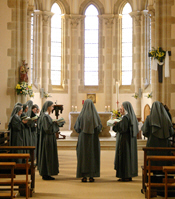
“In every age there have been men and women who, obedient to the Father’s call and to the prompting of the Spirit, have chosen this special way of following Christ, in order to devote themselves to him with an “undivided” heart (cf. 1 Cor 7:34). Like the Apostles, they too have left everything behind in order to be with Christ and to put themselves, as he did, at the service of God and their brothers and sisters. In this way, through the many charisms of spiritual and apostolic life bestowed on them by the Holy Spirit, they have helped to make the mystery and mission of the Church shine forth, and in doing so have contributed to the renewal of society.” [2]
“Contemplation of the glory of the Lord Jesus in the icon of the Transfiguration reveals to consecrated persons first of all the Father, the Creator and Giver of every good thing, who draws his creatures to himself (cf. Jn 6:44) with a special love and for a special mission. “This is my beloved Son: listen to him!” (cf. Mt 17:5). In response to this call and the interior attraction which accompanies it, those who are called entrust themselves to the love of God who wishes them to be exclusively at his service, and they consecrate themselves totally to him and to his plan of salvation (cf. 1 Cor 7:32-34).
This is the meaning of the call to the consecrated life: it is an initiative coming wholly from the Father (cf. Jn 15:16), who asks those whom he has chosen to respond with complete and exclusive devotion. The experience of this gracious love of God is so deep and so powerful that the person called senses the need to respond by unconditionally dedicating his or her life to God, consecrating to him all things present and future, and placing them in his hands. This is why, with Saint Thomas (Aquinas) [3], we come to understand the identity of the consecrated person, beginning with his or her complete self-offering, as being comparable to a genuine holocaust.” [4]
In the footsteps of the Son
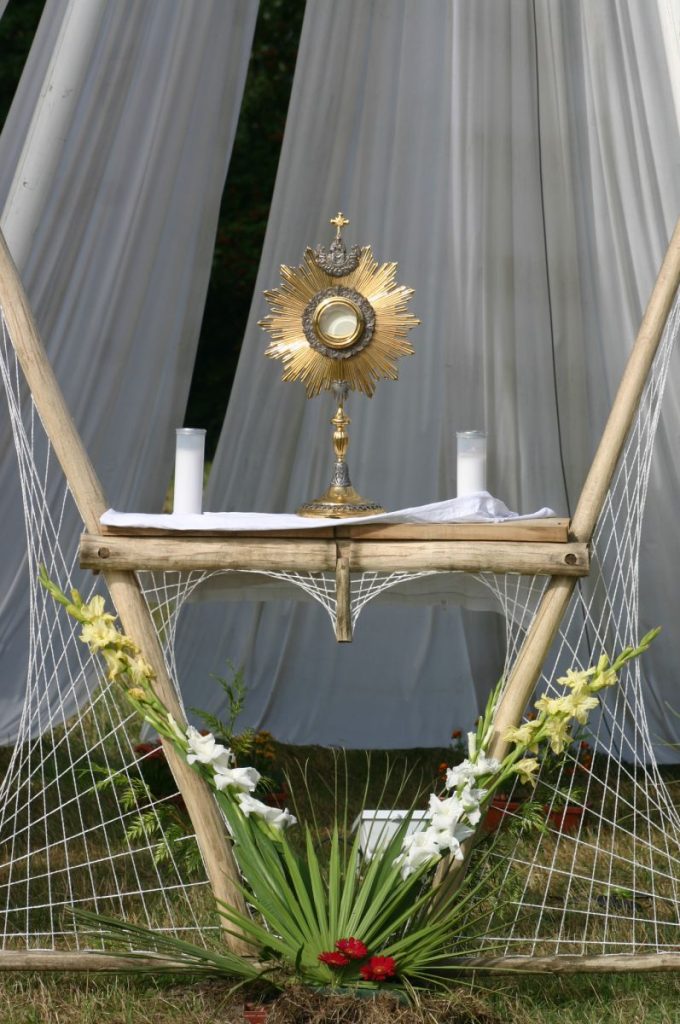
“The Son, who is the way which leads to the Father (cf. Jn 14:6), calls all those whom the Father has given to him (cf. Jn 17:9) to make the following of himself the whole purpose of their lives. But of some, those called to the consecrated life, he asks a total commitment, one which involves leaving everything behind (cf. Mt 19:27) in order to live at his side and to follow him wherever he goes (cf. Rev 14:4). In the countenance of Jesus, the “image of the invisible God” (Col 1:15) and the reflection of the Father’s glory (cf. Heb 1:3), we glimpse the depths of an eternal and infinite love which is at the very root of our being.
Those who let themselves be seized by this love cannot help abandoning everything to follow him (cf. Mk 1:16-20; 2:14; 10:21, 28). Like Saint Paul, they consider all else as loss “because of the surpassing worth of knowing Jesus Christ”, by comparison with which they do not hesitate to count all things as “refuse”, in order that they “may gain Christ” (Phil 3:8). They strive to become one with him, taking on his mind and his way of life. This leaving of everything and following the Lord (cf. Lk 18:28) is a worthy program of life for all whom he calls, in every age. The evangelical counsels, (chastity, poverty and obedience) by which Christ invites some people to share his experience as the chaste, poor and obedient One, call for and make manifest in those who accept them an explicit desire to be totally conformed to him.” [5]
The vocation to consecrated life is a call to follow Christ, the One who says: “No longer do I call you servants (…) but I have called you friends.” (John 15:15). Seized by this love, the one who is called cannot help abandoning everything to follow his beloved, the One who constantly “looks upon him and loves him.” (Mk 10:21). By their entire life, being more and more conformed to Christ, they make “visible” to the world Christ’s loving and saving Presence and they manifest in this way the happiness that lies in this total consecration in the “Sequela Christi” (following Christ).
Consecrated by the Holy Spirit
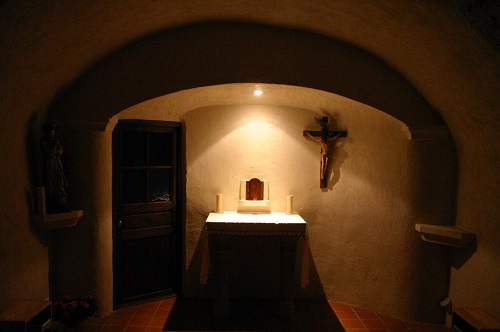
“Like the whole of Christian life, the call to the consecrated life is closely linked to the working of the Holy Spirit. In every age, the Spirit enables new men andwomen to recognize the appeal of such a demanding choice. Through his power, they relive, in a way, the experience of the Prophet Jeremiah: “You have seduced me, Lord, and I have let myself be seduced” (Jer 20:7). It is the Spirit who awakens the desire to respond fully; it is he who guides the growth of this desire, helping it to mature into a positive response and sustaining it as it is faithfully translated into action; it is he who shapes and moulds the hearts of those who are called, configuring them to Christ, the chaste, poor and obedient One, and prompting them to make his mission their own. By allowing themselves to be guided by the Spirit on an endless journey of purification, they become, day after day, conformed to Christ, the prolongation in history of a special presence of the Risen Lord.”[6]
THE VOWS
You can read more about the Religious Vows here.
FORMS OF CONSECRATED LIFE
Religious Life: Priests, Brothers or Sisters in Communities that embrace the spirituality, the charism, and the teachings of the Community’s founder call their way of life Religious life. Members of these Communities take vows of poverty, celibate chastity, and obedience.
“The Religious State is thus one way of experiencing a “more intimate” consecration, rooted in Baptism and dedicated totally to God. In the consecrated life, Christ’s faithful, moved by the Holy Spirit, propose to follow Christ more nearly, to give themselves to God who is loved above all and, pursuing the perfection of Charity in the service of the Kingdom, to signify and proclaim in the Church the glory of the world to come.” [7]
Contemplative religious life:
“Institutes completely devoted to contemplation, composed of either women or men, are for the Church a reason for pride and a source of heavenly graces. By their lives and mission, the members of these Institutes imitate Christ in his prayer on the mountain, bear witness to God’s lordship over history and anticipate the glory which is to come. In solitude and silence, by listening to the word of God, participating in divine worship, personal asceticism, prayer, mortification and the communion of fraternal love, they direct the whole of their lives and all their activities to the contemplation of God.

In this way they offer the ecclesial community a singular testimony of the Church’s love for her Lord, and they contribute, with hidden apostolic fruitfulness, to the growth of the People of God. Thus there is good reason to hope that the different forms of contemplative life will experience continued growth in the younger Churches as an evident sign that the Gospel has taken firm root, especially in those areas of the world where other religions predominate. This will make it possible to bear witness to the vitality of the traditions of Christian asceticism and mysticism and will contribute to interreligious dialogue.” [8]
Apostolic religious life:
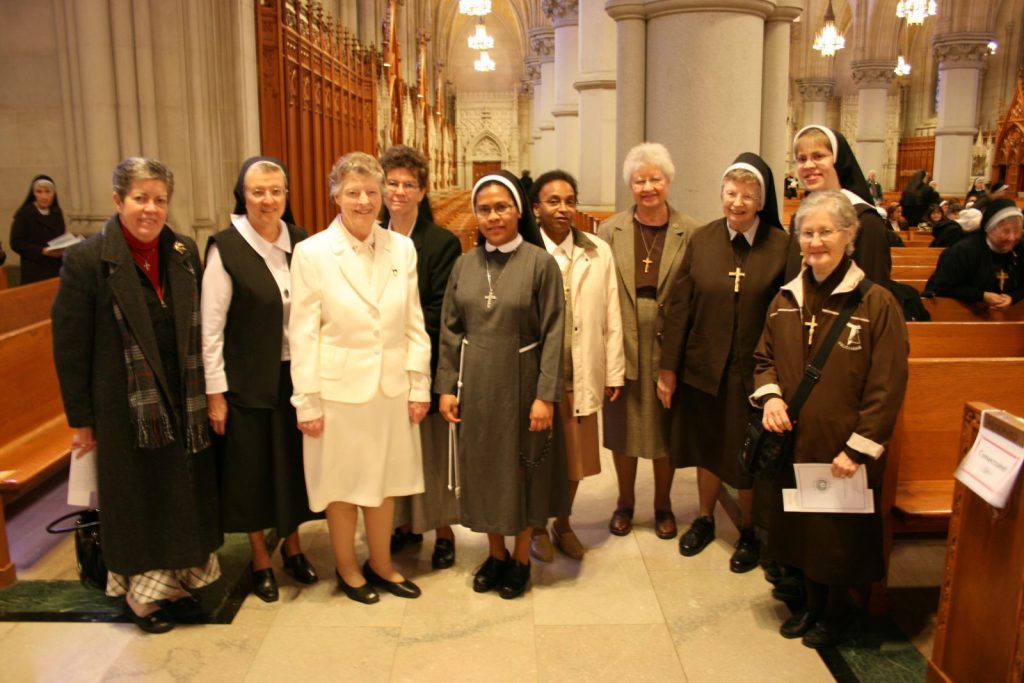
“The West has also known, down the centuries, a variety of other expressions of religious life, in which countless persons, renouncing the world, have consecrated themselves to God through the public profession of the evangelical counsels in accordance with a specific charism and in a stable form of common life, for the sake of carrying out different forms of apostolic service to the People of God. Thus there arose the different families of Canons Regular, the Mendicant Orders, the Clerics Regular and in general the Religious Congregations of men and women devoted to apostolic and missionary activity and to the many different works inspired by Christian charity.
This is a splendid and varied testimony, reflecting the multiplicity of gifts bestowed by God on founders and foundresses who, in openness to the working of the Holy Spirit, successfully interpreted the signs of the times and responded wisely to new needs. Following in their footsteps, many other people have sought by word and deed to embody the Gospel in their own lives, bringing anew to their own times the living presence of Jesus, the Consecrated One par excellence, the One sent by the Father. In every age consecrated men and women must continue to be images of Christ the Lord, fostering through prayer a profound communion of mind with him (cf. Phil 2:5-11), so that their whole lives may be penetrated by an apostolic spirit and their apostolic work with contemplation.” [9]
Secular Institutes: Single or married laymen and women, and also some priests, belong to secular institutes. Secular institutes are groups of consecrated people who live and work as a leaven in the world to evangelize and bear witness to Christian virtues. They make a commitment to live the “evangelical counsels” of poverty, chastity, and obedience. Members do not necessarily live together as a Community. Their goal is to be a transforming Christ-like presence in society.
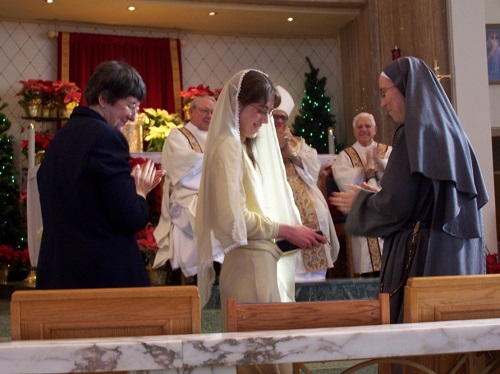
“Secular Institutes seeking to live out their consecration to God in the world through the profession of the evangelical counsels in the midst of temporal realities; they wish in this way to be a leaven of wisdom and a witness of grace within cultural, economic and political life. Through their own specific blending of presence in the world and consecration, they seek to make present in society the newness and power of Christ’s Kingdom, striving to transfigure the world from within by the power of the Beatitudes. In this way, while they belong completely to God and are thus fully consecrated to his service, their activity in the ordinary life of the world contributes, by the power of the Spirit, to shedding the light of the Gospel on temporal realities. Secular Institutes, each in accordance with its specific nature, thus help to ensure that the Church has an effective presence in society. valuable role is also played by Clerical Secular Institutes, in which priests who belong to the diocesan clergy, even when some of them are recognized as being incardinated in the Institute, consecrate themselves to Christ through the practice of the evangelical counsels in accordance with a specific charism. They discover in the spiritual riches of the Institute to which they belong great help for living more deeply the spirituality proper to the priesthood and thus they are enabled to be a leaven of communion and apostolic generosity among their fellow clergy. [10]
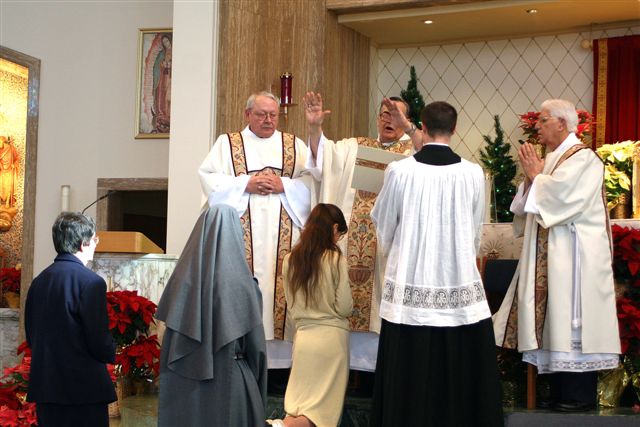
Consecrated Virgins: The consecrated virgin living in the world embodies a definitive vocation in itself. She is not a quasi-Religious, nor is she in a vocation that is in the process of becoming a Religious Institute or Congregation. Nevertheless, she is a consecrated person, with her bishop as her guide. By virtue of the consecration, she is responsible to pray for her diocese and clergy. She is bound to obedience through her Bishop. The consecrated virgin living in the world, as expressed in Canon 604, is irrevocably “consecrated to God, mystically espoused to Christ and dedicated to the service of the Church, when the diocesan bishop consecrates [her] according to the approved liturgical rite.” Click here to read a story about a consecrated virgin.
“It is a source of joy and hope to witness in our time a new flowering of the ancient Order of Virgins, known in Christian communities ever since apostolic times. Consecrated by the diocesan Bishop, these women acquire a particular link with the Church, which they are committed to serve while remaining in the world. Either alone or in association with others, they constitute a special eschatological image of the Heavenly Bride and of the life to come, when the Church will at last fully live her love for Christ the Bridegroom.” [11]
[1] Post Synodal Apostolic Exhortation Vita Consecrata, No. 13
[2] Post Synodal Apostolic Exhortation Vita Consecrata, No. 1
[3] Summa Theologica II-II, q. 186, a. 1.
[4] Post Synodal Apostolic Exhortation Vita Consecrata, No. 17
[5] Post Synodal Apostolic Exhortation Vita Consecrata, No. 18
[6] Post Synodal Apostolic Exhortation Vita Consecrata, No. 19
[7] Catechism of the Catholic Church, No. 916
[8] Post Synodal Apostolic Exhortation Vita Consecrata, No. 8
[9] Post Synodal Apostolic Exhortation Vita Consecrata, No. 9
[10] Post Synodal Apostolic Exhortation Vita Consecrata, No. 10
[11] Post Synodal Apostolic Exhortation Vita Consecrata, No. 7
